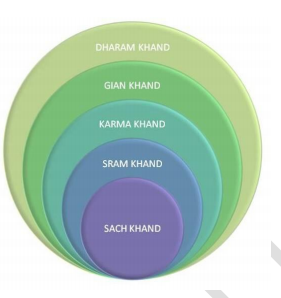Japuji Sahib, the sacred composition by Sri Guru Nanak Dev Ji, is more than just scripture – it’s a guiding light for the soul’s journey toward the Divine. It speaks to the seeker’s heart, illuminating a path that leads from self-awareness to the ultimate state of oneness with Waheguru. One of the most profound teachings in Japuji Sahib is the concept of Panch Khands – the Five Spiritual Realms. These realms mark different stages of spiritual evolution, bringing the seeker closer to the Divine Truth.
Context: The 16th Pauri – “Panch Parwaan Panch Pardhan”
The idea of Panch Khands begins to emerge in the 16th Pauri of Japuji Sahib, where Guru Nanak Dev Ji tells us:
Panch Parwaan, Panch Pardhaan. Panchay Paavahi Dargahi Maan. Panchay Sohahi Dar Raajaan. Pancha Ka Guru Eik Dhiaan
Here, Guru Nanak speaks of those enlightened souls who have been accepted in the Divine Court. They are honored like kings, glowing in divine grace, and their focus remains unwavering on the One True Guru. These chosen ones have crossed the barriers of ego and illusion, stepping into realms beyond ordinary understanding. With this foundation, Guru Nanak takes us on a journey through the Five Khands, guiding us through each stage of spiritual growth.
The Five Khands (Realms) in Japuji Sahib
1. Dharam Khand (Realm of Righteousness)
This is where it all begins – when the seeker becomes aware of divine justice. Life is no longer just a series of random events but a test where one’s actions (Karma) shape the journey ahead. This realm calls upon us to embrace truth, righteousness, and duty as our foundation.
2. Gyaan Khand (Realm of Knowledge)
As the seeker moves forward, they enter Gyaan Khand, where the vastness of creation becomes clear. The soul begins to see the incredible order (Hukam) that governs the universe. This isn’t just about bookish knowledge – it’s a more profound, almost overwhelming realization of the Divine’s presence in everything. It is a humbling yet empowering stage as one starts to grasp the grandeur of Waheguru’s creation truly.
3. Saram Khand (Realm of Effort and Grace)
With knowledge comes responsibility; in Saram Khand, the seeker actively works toward self-purification. This is a stage of discipline, meditation, and devotion. The ego is slowly chipped away, replaced with humility and love. Here, divine grace begins to take over, shaping the seeker into a being of light and wisdom.
4. Karam Khand (Realm of Grace and Power)
At this stage, divine grace floods the soul completely. Worldly limitations no longer bind the seeker. Karam Khand is where fearless spiritual warriors reside – those who live in divine consciousness, radiating virtues like courage, humility, and unwavering faith. The soul is now profoundly aligned with the Divine Will, free from the illusions of ego and attachment.
5. Sach Khand (Realm of Truth and Oneness with Waheguru)
And then, the final destination – Sach Khand, the realm of absolute truth. The seeker merges completely with Waheguru, experiencing boundless bliss and eternal peace. Guru Nanak describes this as the Divine’s abode, a place beyond human understanding, where divine creativity and cosmic play continue infinitely. It is not just a place – it is a state of being, the ultimate realization of the Eternal Truth.
Conclusion: Walking the Path of Enlightenment
The journey through the Five Khands isn’t just a theoretical concept – it’s a real, lived experience that Guru Nanak invites us to embark upon. It starts with awareness in Dharam Khand, deepens into wisdom, transforms through discipline and devotion, and ultimately leads to divine grace and truth. Every step on this path brings the soul closer to its true purpose – union with Waheguru.
Guru Nanak’s message in Japuji Sahib is clear: this path is open to all, regardless of background, status, or intellect. It requires sincerity, love, and a deep yearning for the Divine. May we all walk this sacred journey with open hearts and steadfast faith.


Leave a Reply